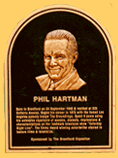|
|
|
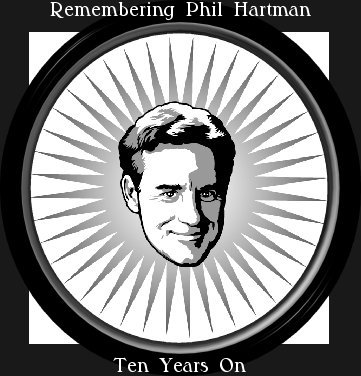
by Sir John Reid Hatchporch
Artwork © 2004 Charles DJ Deppner
It's not very common that an event can knock the wind out of your sails...even ten years after its happened. Sure, we all face private and personal dramas on a regular basis: financial difficulties, family tragedies, the loss of loved ones...but aside from ardent "superfans" and devotees of trash culture like "Access Hollywood," how often is it that the death of an entertainer can not only catch you totally off guard but go on to profoundly impact your life in various ways even years later?
Such is the death of Phil Hartman for me. Like John Candy before him, Phil was a man I had grown up watching. He was always just "there." To be robbed of his talents and presence at such an early age--and under such tragic and ultimately avoidable circumstances--still reverberates so strongly with me. Like Candy, John Ritter and Richard Jeni, hardly a day goes by when I don't think about Phil and I find it difficult to view his stellar body of work without feeling a little melancholy and wondering about what could have been.
Phil Hartman was there when I began one of my greatest pop culture "love affairs," I suppose you could say: "Saturday Night Live." I was about nine or ten years old and my tastes were beginning to broaden. Watching Nick at Nite's half hour bite-size "best of"s from the "classic era" probably whetted my appetite, and I soon turned to the current show on NBC. The late '80s cast was the first time I began watching SNL religiously and unbeknownst to me at the time, was deemed the best cast since the original Not Ready for Prime Time Players. Dana Carvey was the first big draw for me, with his Church Lady and a bevy of other memorable characters. This was around the time I became a huge fan of Martin Short (who would become my idol for several years), and I probably saw some of that same spirit and versatility in Carvey. But the entire cast was a treasure trove and remains my favorite to this day. Jon Lovitz, Jan Hooks, Kevin Nealon, Dennis Miller...later on, Mike Myers. These years were enormously influential on me and my comedic mind.
And then there was Phil. I was a child, and to me, he was the old guy in the funny hornrims during the open credits who waved his hand over his face and made his frown turn to a smile. For me, Phil was also a little intimidating. So devoted was he to his characters and to his work that it was almost as if he approached his comedy as a very serious business. (I would later understand what a valuable--and ultimately rare--commodity this was in the comedic world.) In retrospect, the way he portrayed his characters transcended mere comedy. It was almost as if he saw comedy as just another vehicle for his prodigious acting talents. The characters he was playing and situations he was put into just happened to be funny. Deep down, Phil Hartman was an actor...and a good one.
I would later come to find out that Phil was referred to in SNL circles as "The Glue" because of the way he held the cast together and his ability to portray a wide variety of different characters. If you needed a straight man, he was your guy. A fast talking ad pitch-man? There's no one better. An unfrozen caveman lawyer? A grunting Frankenstein with no real lines to speak of? How about Phil? A Peter Graves impersonation? Guess who?
And the one common thread he brought to all of these characters and impersonations was subtlety. There's an old Second City saying: "wear your characters lightly." While Phil Hartman's training had been with another famous improv troupe--The Groundlings--this seemed to be Phil's mantra as well. In fact, he absolutely personified it. Moreover, he was a consummate professional, both on screen and (as his colleagues have attested to) off screen. For instance, it was a very. very rare occasion indeed that Phil would break character in the middle of a sketch (one of the Frankenstein sketches being the only example I can think of). In these days of Jimmy Fallons and Horatio Sanzes and Debbie Downers, where breaking up IS the joke, this trait of Phil's is fondly remembered.
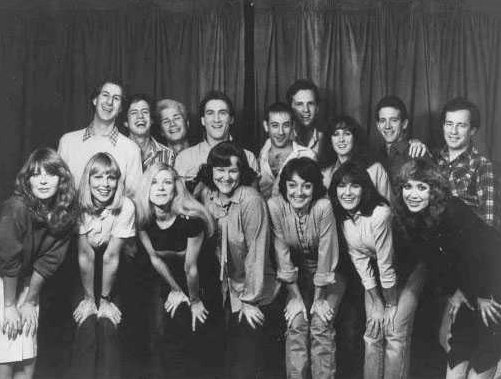
Groundlings, circa early 1980s
At the time, my favorite Phil Hartman portrayal on SNL was Phil Donahue. I can't even remember the exact reasons why it struck such a chord with me, but it was probably due to the fact that I actually watched "Donahue" from time to time, even at that young age. There was something about Hartman's Donahue that was so hilarious to me back then: the ridiculous cadences of his sentences...the way he'd exaggeratedly reach across the audience to offer someone the mic...the way he'd tap the mic on his head when listening to a frustrating answer from a guest...and that goofy looking wig. And even though one could make the argument that later cast member Darrell Hammond went on to do a better vocal impression of Donahue, Hartman's is still my favorite.
It had been Jon Lovitz who had encouraged SNL producer Lorne Michaels to take a look at his close friend and fellow Groundling Phil Hartman when considering future cast members (a thank you from Jon to Phil for having encouraged Lovitz to join the Groundlings). Hartman and Lovitz had an undeniable chemistry together, as they demonstrated in their many "two-handers" for the show. Similarly, Jan Hooks--still my favorite female cast member--and Phil seemed to have a particularly special relationship on screen and they always played off each other perfectly. Perhaps it was a similar sort of sensibility they had, or their chameleonic natures, but any time you'd see them in a sketch together it just seemed to click.
Hartman has the honor of being at the heart of one of my all time favorite--if not THE favorite--SNL sketches: "The Sinatra Group." A parody of the political pundit show "The McLaughlin Group," "The Sinatra Group" featured a panel of musicians in a roundtable discussion of such hot button modern day issues as "Ava Gardner or Rita Hayworth? Who would you rather nail?" Hartman's Sinatra impression got right to the heart of the man, portraying him as a no nonsense, rough around the edges, old fashioned slice of machismo. I've often had a hard time expounding on why I often cite it as my favorite SNL sketch, but it does feature all the classic SNL hallmarks: funny impressions, colorful characters, lightning quick writing and a bevy of quotable one liners. (I recently found out this sketch was written by none other than Robert Smigel.) Music humor is always a plus with me as well.
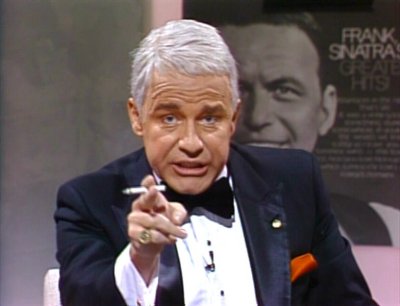
"I've got chunks of guys like you in my STOOL!"
You can't even look at that without laughing, can you?
Perhaps Phil made the perfect Sinatra because of his own timeless qualities. Phil was definitely one of the last of a dying breed. In sharp contrast to cast members like Adam Sandler, Phil was an "old school" brand of comedian and as such was often saddled with the "period" roles, which he always played to the hilt. You could tell Phil had grown up with a steady diet of Burns & Allen, Jack Benny, Ernie Kovacs, Alan King, Ed Sullivan...he was truly an old soul.
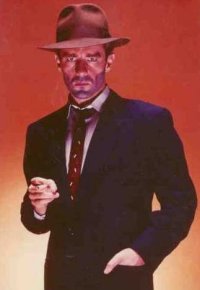
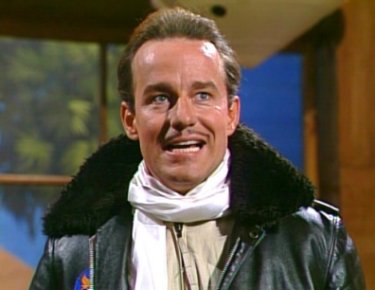
Though I probably didn't consciously realize it at the time, I had already "met" Phil (and Jan!) via some of my favorite films of that era, including my third favorite movie of all time: "Pee-wee's Big Adventure." Not only had Phil co-written it with Paul Reubens and Michael Varhol, but he'd also had at least three cameos in it. Phil was also in "Three Amigos!" (in a scene with Jon Lovitz, no less) and had portrayed Kap'n Karl in both the original "Pee-wee Herman Show" (which I didn't see until years later) and the first season of "Pee-wee's Playhouse" (which I was also a fan of pre-SNL).
Once I started high school, I began to drift away from SNL for the majority of the '90s. The loud, brash, "bad boy" era of Sandler, Farley and Rock began to take over. Dana Carvey and Jon Lovitz had long gone, and stalwarts like Hartman seemed to be largely relegated to the background. Even Mike Myers' roles diminished, particularly after Carvey's departure rendered Wayne's World sketches obsolete. It was during this time that Phil began to branch out a bit, with a long standing run as various voices on "The Simpsons" and a number of film appearances, some of which saw Phil outright stealing the show. (Mike Myers' "So I Married An Axe Murderer," with Phil doing a cameo as a disturbed tour guide at Alcatraz, comes to mind.)
Then along came a sitcom called "NewsRadio." While the show dovetailed with my college years and my busy student life eventually necessitated that I drift away from it (and television in general), "NewsRadio" was one of my favorite shows of that time period. I was a huge "Kids in the Hall" fan, so seeing Dave Foley in a sitcom was a welcome sight. And here was Phil Hartman--the guy I grew up watching play The Anal Retentive Chef--in a slightly odious role: Bill McNeal, the resident ego at the radio station. In retrospect, it was a role tailor-made for Hartman: a newsradio anchor with a classically smooth baritone voice who fancies himself the star of the show. Only a man with the voice and subtlety of Phil Hartman could pull this off and still make you like him.
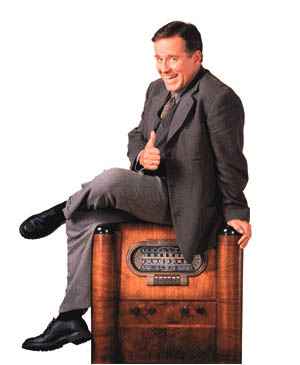
"Haven't you ever heard the expression 'when life gives you lemons, make lemonade, and then throw it in the face of the person who gave you the lemons until they give you the oranges you originally asked for?'"
And speaking of that voice...surely we have not heard the likes of Phil's rich, commanding tones in ten years. In my opinion, Phil ranks up there with such luminaries as Paul Frees in terms of the resonance and power of his speaking voice. You only get one Phil Hartman.
It was a spring day and I was sitting in my dormitory lobby. For some reason, CNN was on, and I was vaguely paying attention. I seem to remember that someone mentioned "that guy from SNL died." After some questioning, I ascertained that it was Phil Hartman. My heart sunk. What? Phil Hartman? The guy I grew up watching? I remember asking over and over "are you sure?" As this person related the disgusting details of what happened, I was struck with utter disbelief. Phil was a guy who was "always there." His voice was everywhere. With "NewsRadio," he was at the top of his game. Surely this was not happening. For weeks, every time my roommate--a fellow SNL devotee--and I ran into each other, we'd just say "Phil Hartman! Ah!" We just couldn't get over it.
Phil was still relatively young, in good health and in peak form in his career. This just wasn't supposed to happen. For him to go out so tragically made no sense. With a guy like John Candy, you saw the warning signs...with Phil, it hit you broadside, like a bus. For me, the death of Phil Hartman is one of those rare "I remember where I was" moments.
A few weeks later, SNL aired a moving and well compiled "Tribute to Phil Hartman," which included some of his finest sketches and impersonations. Like all SNL "best of"s, it was missing a lot of great material (and with a performer like Phil, easily could have run another two or three hours) but served as a potent reminder of the range, depth and subtlety he brought to his many characters. In 2004, this was issued on DVD as "The Best of Phil Hartman." The disc includes his original audition tape for SNL and is, by far, the best SNL audition tape I've ever seen. Phil seems completely relaxed, exuding confidence but not cockiness. Phil regales us with impressions, accents and a few brief sketches with his friend Jon Lovitz.
On that note, it wasn't until later on that I realized that Phil always seemed to have a self-effacing quality to him, even in his strongest moments. Perhaps this was yet another bi-product of the "old school" attitude and persona he possessed. In retrospect, watching interviews with Phil is almost eerie. A few years ago, a friend of mine showed me a "Tonight Show" appearance of Phil's from the early '90s. Phil--a bit like Will Ferrell nowadays--seemed to be in character the entire time, to a degree...playing the role of Phil Hartman: Classic Entertainer. This largely seems to be another relic of days gone by, with our culture's increasing attention to every minute and sordid detail of a celebrity's personal life. Phil was a professional and kept his work and personal life separate.
Two years after Phil's death, SNL aired the special "SNL 25," the 25th anniversary retrospective of the show. This included an incredibly bittersweet moment in which most of the late '80s cast got together to pay a very short tribute to Phil and introduce a poignant period sketch with Jan and Phil. (This sketch also closes the "Best of..." DVD.) To this day, I cannot bring myself to watch this sketch and, on several occasions, have had to leave rooms and turns off DVDs whenever it comes up. It is simply too painful.
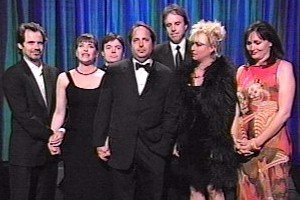
As I got older, Phil's death carried even more weight than I had anticipated. As I acquired more experience on stage and contemplated my future, I looked to Phil's career for inspiration. Phil didn't enter the Groundlings until his late 20s and didn't start his stint on SNL until he was 38. And as an actor and comedian, Phil's influence on me as a performer has only grown through the years. His consistency, chameleonic nature and professionalism is something every actor should study intently and aspire to.
Every once in a while, I will hear Phil's voice drifting in from somewhere. I can recall the first time Christopher Walken hosted the show after Phil's death. SNL made the wise decision to continue using Phil's elegant voiceovers for the "Continental" sketches. The first time I heard it, I was rather surprised, but pleasantly so. Phil lived on.
As I mentioned in my tribute to John Ritter five years ago, I'm always more saddened by the death of a comedian than any other public figure or entertainer. There is something rather bittersweet about a comedian leaving us, especially if it's under tragic and unexpected circumstances. Entertainers can appeal to the heart, the mind or the body...comedians do all three. Not only that, they appeal to your subconscious, often triggering involuntary reactions in an individual. (Who really knows where laughter comes from?) Comedians only strive to make people laugh and largely forget about the ills of this world. If someone has the ability to make you laugh, that's perhaps the greatest gift of all.
To this day, I have two TV Guide articles up on my wall from shortly after Phil's death. I've just never had the heart to take them down. I remember seeing a news story the night Phil died that showed the marquee outside of The Comedy Store in Hollywood. The sign simply read "RIP Phil. Make God Laugh." I'm not what you would call a religious man, but this often gives me solace whenever I remember Phil or become angry over the insane circumstances of his death. Phil not only left an indelible impression on this planet before leaving, but he also...
Ah hell with it...

"ANNNNNNNNNNNG!!! FIIIIIIIIIIIRE BAAAAAAAAAAAAAAAD!!!"
Phil probably would have wanted it this way.
